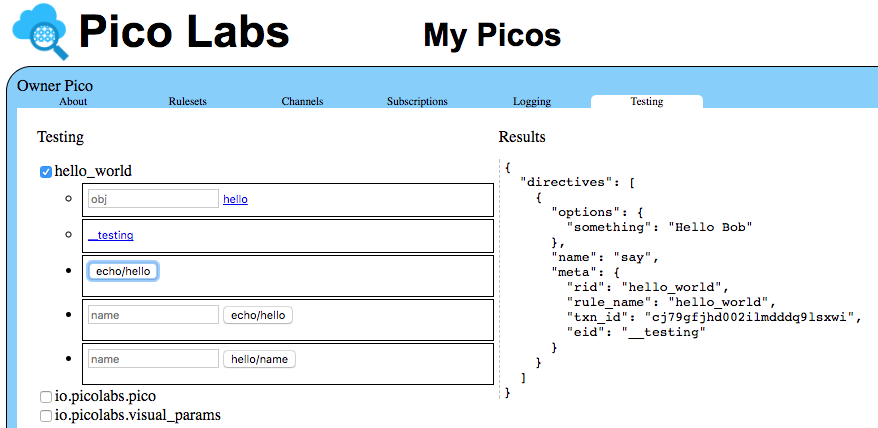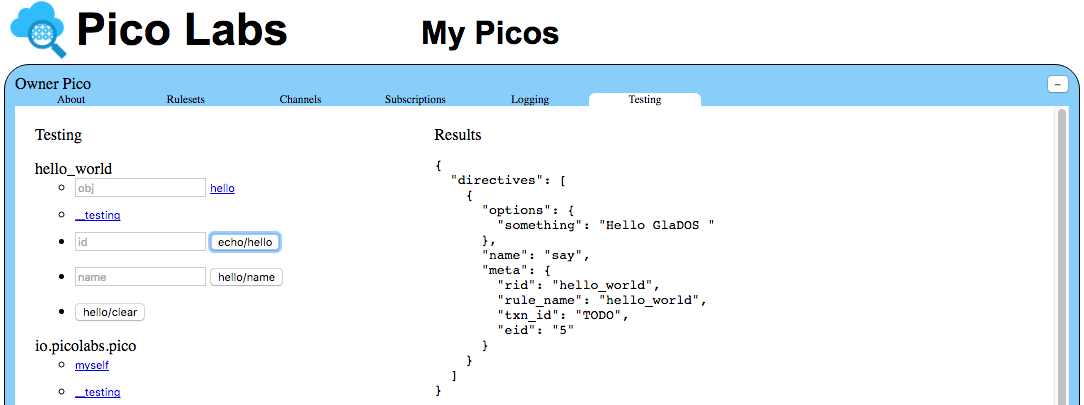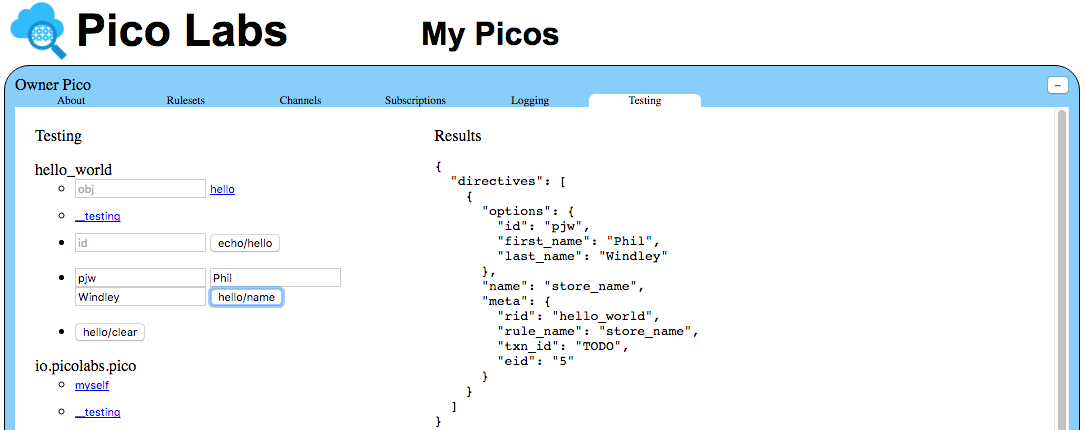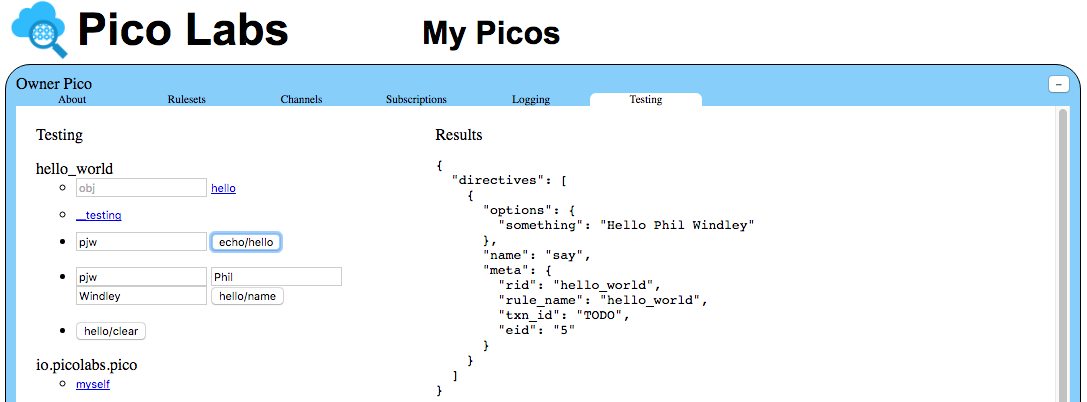...
- Explain what entity variables are.
- Use rules to mutate entity variables.
- Use functions to simplify usage of entity variables.
- Use entity variables to create persistent picos.
- Understand how rules can use explicit events to chain rules
Prerequisites
You should have completed the following lessons:
...
| Code Block |
|---|
rule hello_world {
select when echo hello
pre{
name = event:attr("name").defaultsTo(ent:name,"use stored name")
}
send_directive("say") with
something = "Hello " + name
} |
Test your persistence by raising an event to store_name without providing a value. This will cause the "defaultsTo" operator to provide the persisted name, which will be mentioned in the directive.
You have now created and used a simple entity variable to give your Pico persistent state.
Complex Entity Variables
We used an entity variable to store a simple string, but you can also store complex objects in your entity variables. To search deep branches of your object you provide hash paths.
Let's change the hello_world ruleset to know multiple users.
To do this we will need to do the following:
- Change our entity variable to be a map of users.
- Modify
store_nameto store multiple users (one at a time). - Modify
hello_worldto greet from a user id.
Modify the entity variable in store_name to be a hash of user id's and names.
Start by adding a rule to initialize a structure to contain the map of user names. We'll bind a name "clear_name" to a structure with one, default, name. Be sure to put this declaration in the globals section of the ruleset.
| Code Block |
|---|
clear_name = { "id": "_0", "name": { "first": "GlaDOS", "last": "" } }
rule clear_names {
select when hello clear
always {
ent:name := clear_name
}
} |
If you add the following to the "events" array in the "__testing" structure, then you'll have a UI in the "Testing" tab of your Pico to initialize the entity variable "name".
| Code Block |
|---|
{ "domain": "hello", "type" : "clear" } |
Validate your code changes, and refresh the "Testing" tab.
Refresh the "Rulesets" tab to verify that the entity variable has been prepared.
Now, let's modify the "hello_world" rule to obtain the name for the greeting from the structure. All we need to change is the code in the rule prelude.
| Code Block |
|---|
id = event:attr("id").defaultsTo("_0")
first = ent:name{[id,"name","first"]}
last = ent:name{[id,"name","last"]}
name = first + " " + last |
You'll notice that this rule used to expect the name as an event attribute, but now it expects the id. So, adjust the entry accordingly in the "__testing" object.
| Code Block |
|---|
{ "domain": "echo", "type": "hello", "attrs": [ "id" ] } |
Validate and install the modified ruleset. Refresh the "Testing" tab and click on the "echo/hello" button. Notice the directive now suggests a greeting to the default name.
Now, we need a rule to add another name to our entity variable structure.
| Code Block |
|---|
rule store_name { select when hello name pre{ passed_id = event:attr("id").klog("our passed in id: ") passed_first_name = event:attr("first_name").klog("our passed in first_name: ") passed_last_name = event:attr("last_name").klog("our passed in last_name: ") } send_directive("store_name") with id = passed_id first_name = passed_first_name last_name = passed_last_name always{ ent:name_s := ent:name_s.defaultsTo(clear_name,"initialization was needed"); ent:name_s := ent:name_s.set([passed_id,"name","first"],passed_first_name); ent:name_s := ent:name_s.set([passed_id,"name","last"],passed_last_name) } } |
Update the entry for this rule in the "__testing" structure, to reflect the fact that it now expects three event attributes.
| Code Block |
|---|
{ "domain": "hello", "type": "name", "attrs": [ "id", "first_name", "last_name" ] } |
Refresh the "Testing" tab and add a new name, filling in the three fields and clicking on the "hello/name" button.
Now use the new "id" value and click the "echo/hello" button. Note the suggested greeting in the directive sent by this rule.
Splendid! You have learned to use complex entity variables.
Querying Persistent Variables
We could use our entity variable how it is but the code will quickly become un-readable.
Let's create some functions to access our entity variable.
To do this we will need to:
- Add a
usersfunction to retrieve all users - Add a
namefunction to retrieve a user from id. - Modify
hello_worldto useusersandnamefunction
Create two functions in the global block that, returns all users and return user name given an id. You can read more about functions here. A function returns the value of its last expression.
| Code Block |
|---|
name = function(id){
all_users = users();
nameObj = id => all_users{[id,"name"]}
| { "first": "HAL", "last": "9000" };
first = nameObj{"first"};
last = nameObj{"last"};
first + " " + last
}
users = function(){
ent:name
} |
With the functions defined in the global block, we can simplify the prelude of the "hello_world" rule:
| Code Block |
|---|
pre{
id = event:attr("id").defaultsTo("_0").klog("the id")
name = name(id)
} |
After saving your changes to the ruleset, refresh the "Testing" tab and verify that all is working as before.
Sweet, you now can add as many users as you want and have your ruleset say hello to each user.
Next Level
We have multiple users our ruleset can recognize with an id, but it would be so much cooler if we knew how many times our ruleset says hello to a user.
Let's make our ruleset smarter.
To do this we will need to use the structure in our entity variable to count visits.
| Code Block |
|---|
rule hello_world {
select when echo hello
pre{
id = event:attr("id").defaultsTo("_0").klog("the id")
name = name(id)
visits = ent:name{[id,"visits"]}.defaultsTo(0) + 1
}
send_directive("say") with
something = "Hello " + name
fired {
ent:name := ent:name.set([id,"visits"],visits)
}
} |





